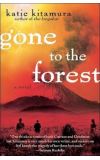
26 Feb 2013 13:03:27
Gone to the Forest is set in a nameless country convulsing with the birth pangs of anti-colonial revolution. Having claimed a vast tract of land 40 years ago, one of the first white settlers is preparing to hand it down to his only son, Tom. Cold and domineering, the old man has made life-long fetishes of his power over the land and his power over women. After growing up "under the weight of this man", Tom is timid, unworldly and a disappointment to his father. Unconcerned with power, he loves the land of his birth innocently – love it is clear he would rather give the old man.
As the nationalist rebellion sweeps south towards their domain, a dark, dreamlike series of events unfolds that ruptures the old world order. The old man, still virile and acquisitive, beds the girl that he had arranged for his son to marry. But the girl is gang raped and – we later learn – impregnated by local white men. ("Men suited to this new age of violence.") Meanwhile, a nearby volcano erupts after centuries of slumber. The landscape is covered in ash, and the old man's lucrative fish farm is destroyed. Forced into appeasement measures won by the nationalists, the old man signs away most of his land.
Like Coetzee's Disgrace, Kitamura foregrounds (almost exclusively, it must be said) the consciousness of white colonials, as their once expansive world starts "shrinking to a piece of paper". The truly outstanding element is the old man's demise, which could almost be filleted out as a novella – a cold, powerful father dying under the tortured gaze of a bitter, unloved son.
Gone to the Forest is bold for many reasons: not only for the cultural, sexual, historical and national boundaries that Kitamura steps over to get into the minds of her characters. But also for the way she explores the cruelty of colonisation – whether it's of homelands, or of women's bodies – within a hauntingly beautiful, startlingly brief story of an old man dying.

